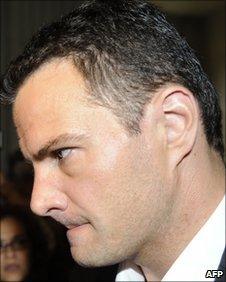SocGen trader Kerviel accused of taking 'inhuman' risks
- Published

Mr Kerviel faces up to five years in jail if convicted
Alleged Societe Generale "rogue trader" Jerome Kerviel took "inhuman risks" that "no bank in the world could take" his ex-boss has told a Paris court.
Mr Kerviel, 33, is blamed for losses of 4.9bn euros (then worth £4.3bn).
He has been under investigation since SocGen unveiled the losses in 2008, which it said were caused by unauthorised deals carried out by him.
He denies accusations of forgery, breach of trust and unauthorised computer use.
'No reprimand'
In a passionate testimony, the former head of SocGen's investment division, Jean-Pierre Mustier, said Mr Kerviel had "never said sorry" for his actions, which saw him run up $50bn worth of trades that Societe Generale rushed to unwind.
"Jerome Kerviel is not Robin Hood," he told the court. "Jerome Kerviel is the trader who lost the largest amount of money in the world."
The former trader has always maintained the bank knew about the risky deals, but turned a blind eye to them.
He admitted frequently passing trading limits and logging fake transactions to cover his gambles.
"It was a common practice," Mr Kerviel told the court.
"Every morning we got an e-mail informing us of limits being exceeded," he said, but added there was "never a reprimand".
Mr Mustier told the court that traders were "informed of their limits".
The former SocGen executive stepped down as head of investment banking in May 2008 in the wake of the scandal and left the bank altogether last year.
Mr Mustier told the court how he feared Mr Kerviel might be suicidal when his deals had been exposed, to the extent that the boss even accompanied his trader to the bathroom to ensure he did not harm himself.
'Duplicity'
The trial in Paris is expected to last three weeks. Mr Kerviel could face five years in prison as well as a fine of 375,000 euros if convicted.
The revelation about the unauthorised deals shook the financial markets, but was soon overtaken by the global sub-prime mortgage crisis, the collapse of Lehman Brothers and Bernard Madoff's Ponzi scheme.
SocGen was fined 4m euros by the French regulator for weaknesses in its internal controls and has since spent about 130m euros on tightening its systems.
In his book, The Spiral: Memoirs of a Trader, Mr Kerviel wrote that he was "at the heart of the great banking orgy", and that traders were "only ever given the same consideration as a cheap prostitute: a quick thank-you for a good day's takings".
His lawyer, Olivier Metzner, is expected to argue that high-risk trades at SocGen were normal and that his client's managers knew what he was doing.
He may also claim that the bank decided to turn against Mr Kerviel in order to divert attention away from SocGen's large losses in the US sub-prime mortgage market.
Societe Generale's lawyer, Jean Veil, has accused Mr Kerviel of "duplicity" for reassuring his bosses that nothing was wrong.
SocGen is also expected to submit a symbolic claim against its former employee for the recovery of the full 4.9bn euros that his trading position cost them.
The police investigation into Mr Kerviel concluded early on that he had not personally profited from his activities and had not committed fraud.
Mr Kerviel currently works as a computer technician earning 2,300 euros a month.
- Published8 June 2010
- Published5 May 2010